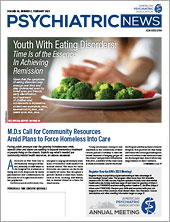As I write this column in the first month of 2023, the year is already turning out to be as busy and auspicious for mental health as in 2022! We began the new year against the backdrop of the latest findings of the APA Healthy Minds Poll, which showed that more Americans rated their mental health as fair or poor in 2022 than in 2021 (37% versus 31%) and that a significant number of Americans were making New Year’s resolutions about their mental health in anticipation of more stress ahead in 2023. As mental health remains front and center in our private lives, Congress ended 2022 with bipartisan legislation that funded key policy measures to improve access to mental health care (“
Congress Passes Spending Bill With Several APA Priorities”). These policy gains addressed key issues and priorities for psychiatry and APA, including legislation proposed and championed by our policy and government relations teams and on which APA members testified in the House and the Senate over the past year, myself included.
These are among the highlights of gains made during the final days of the 117th Congress: the addition of 200 graduate medical education slots, including 100 dedicated specifically to psychiatry and its subspecialties; extension of pandemic-era telehealth flexibilities under Medicare; and new grants to support implementation of the Collaborative Care Model in primary care practices. While these are important wins for advancing psychiatry and mental health, they are nonetheless just a start in what is needed to address the current and ongoing mental health needs of Americans post-pandemic. We have our work cut out for us in 2023, including continued advocacy for measures to bolster the effectiveness of the 988 mental health crisis hotline with community resources and investments; addressing ongoing workforce shortages; achieving mental health parity in practice; leveraging telehealth and other innovative technology to advance access to high-quality, evidence-based mental health care; and championing patient safety.
While we continue to advance our policy initiatives in Washington, we cannot do this work alone. Collaboration with other medical organizations and professional societies is a key element of boosting our effectiveness in advancing health, including mental health, and gaining momentum and support for key legislation on the state and federal levels. One critical partnership is with the AMA—our psychiatry delegation to the policymaking House of Delegates is growing in influence and size with participation of psychiatry’s subspecialty organizations. Recent contributions of our psychiatry delegation include championing 988 to obtain critical AMA support, advocating for the end of discriminatory medical licensing questions related to mental health that are more restrictive and probing than questions about physical health, and recognizing the need for additional investments in the physician workforce.
As we go to press, members of the AMA delegation and APA government relations staff have just returned from the annual AMA State Advocacy Summit, which met in person for the first time since 2019. Summit participants addressed challenges facing medicine at the state level—where the majority of medical practice and private insurance is regulated—and opportunities for action and change. Many of the featured topics had key relevance to APA and our members, including addressing physician wellness through the creation of confidential resources for physicians to address well-being and burnout, eliminating discriminatory medical licensing questions about mental health, and collaboration with state medical boards. Another central issue for both APA and the AMA is patient safety related to prescriptive authority and nonphysician practice parameters; one of the topics discussed at the meeting was the emerging evidence about gaps in quality and higher spending when nonphysician professionals serve in independent roles in primary care and emergency settings. Other important areas on the advocacy agenda included insurance priorities, discriminatory prior authorization requests, continued focus on effective measures to combat the opioid epidemic, and considerations in delivering comprehensive reproductive health care following the U.S. Supreme Court 2022 Dobbs decision.
Our collaboration with the AMA is continuing at this year’s AMA National Advocacy Conference in Washington, D.C., to provide a critical assessment and call to action on federal law and policy influencing health and the practice of medicine.
There is no question that in 2023 state and federal advocacy for health and mental health will continue to be front and center in APA’s work on behalf of our profession, members, and those whom we serve. You can follow my efforts in real time on Twitter
@Pres_APA, and, as always, I look forward to hearing from you, especially about your advocacy adventures and successes! ■

